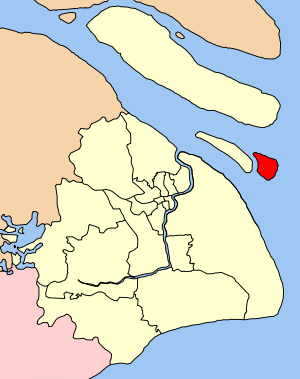Hengsha Island
| Hengsha | |||||||

|
|||||||
| Hengsha Island | |||||||
|---|---|---|---|---|---|---|---|
| Traditional Chinese | |||||||
| Simplified Chinese | |||||||
| Literal meaning | Heng Sands Island | ||||||
|
|||||||
| Hengsha Township | |||||||
| Traditional Chinese | |||||||
| Simplified Chinese | |||||||
|
|||||||
| Transcriptions | |
|---|---|
| Standard Mandarin | |
| Hanyu Pinyin | Héngshā Dǎo |
| Transcriptions | |
|---|---|
| Standard Mandarin | |
| Hanyu Pinyin | Héngshā Xiāng |
Hengsha is a low-lying alluvial island at the mouth of the Yangtze River in eastern China. Together with the islands of Chongming and Changxing, it forms Chongming County, the northernmost area of the provincial-level municipality of Shanghai. Its population was 33,400 in 2008.
Heng is the horizontal, rightward stroke ⟨一⟩ used in writing Chinese characters, similar in form to a dash. It is also used to mean "horizontal". It was applied to the island for the way it formerly stood athwart the mouth of the Yangtze, although time has now given it a round or heart-like shape and moved it in line with Changxing.
Hengsha first emerged from the Yangtze in 1858. It began to be reclaimed for agricultural purposes in 1886 or 1890. Hengsha Township was established in 1909. Between its formation and 1958, the island gradually expanded towards the northwest while receding to the southeast: together, these actions caused the island to "migrate" about 5.25 kilometers (3.3 mi) in the direction of Changxing. Under the Republic, the island carried on an active trade in grains via junk.
Hengsha was originally part of Chuansha County, which later merged into Pudong. In 1958, the island was placed under Baoshan County, as its ferries operated from the harbor of Wusong at the mouth of the Huangpu. The island's wandering was ended by the erection of a seawall and stabilization of the banks around the island. The next year, it saw a major influx of population, including boat people who were organized into fishing brigades. During the Down to the Countryside Movement, many of the sent-down youth from Shanghai travelled no further than Hengsha, where they assisted in reclamation, urban defense, and propaganda efforts.
...
Wikipedia
